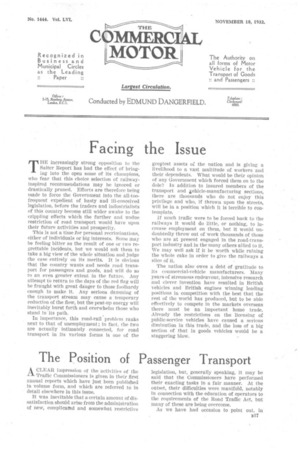Facing the Issue
Page 43

If you've noticed an error in this article please click here to report it so we can fix it.
THE increasingly strong opposition to the Salter Report has had the effect of bringing into the open some of its champions, who fear that this choice selection of railwayinspired recommendations may be ignored or drastically pruned. Efforts are therefore being made to force the Government into the all-toofrequent expedient of . hasty . and ill-conceived legislation, before the traders and industrialists of this country become still wider awake to the crippling effects which the further and undue restriction of road transport would have upon their future activities and prosperity.
This is not a time for personal recriminations, either of individuals or big interests. Some may be feeling bitter as the result of one or two regrettable incidents, but we would ask them to take a big view of the whole situation and judge the case entirely on its merits. It is obvious that the country wants and needs road transport for passengers and goods, and will do so to an even greater extent in the future. Any attempt to return to the days of the red flag will be fraught with great danger to those foolhardy enough to make it. . Any serious damming of the transport stream may cause a temporary reduction of the flow; but the pott-up energy will inevitably burst forth and overwhelm those who stand In its path. .
In importance, this road-rail problem ranks next to that of unemployment ; in fact, the two are actually intimately connected, for road transport in its various forms is one of the greatest assets of the nation and is giving a livelihood to a vast multitude of workers and their dependents. What would be their opinion of any Government which forced them on to the dole? In addition to insured members of the transport and &aide-manufacturing sections, there are thousands who do not enjoy this privilege and who, if thrown upon the streets, will be in a position which it is terrible to contemplate.
if much traffic were to be forced hack to the railways it would do little, or nothing, to increase employment on them, but it would undoubtedly throw out of work thousands of those who are at present engaged in the road-transport industry and in the many others allied to it. We may well ask if it be worth while ruining the whole cake in order to give the railways a slice of it.
The nation also owes a debt of .gratitude to its commercial-vehicle manufacturers. Many years of strenuous endeavour, intensive research and clever invention have resulted in British vehicles and British engines winning leading positions in competition with the best that the rest of the world has produced, but to he able effectively to compete in the markets overseas there must be an important home trade. Already the restrictions on the licensing of public-service vehicles have caused a serious diminution in this trade, and the loss of a big section of that in goods vehicles would be a staggering blow.




















































































































